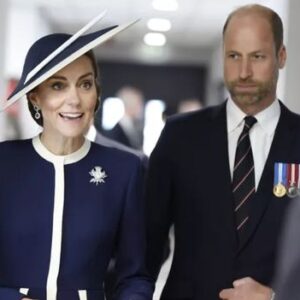
When the TV adaptation of Margaret Atwood’s “The Handmaid’s Tale” first premiered on Hulu in 2017, just a few months after Donald Trump was sworn in as president for the first time, its dystopian backdrop of a fictional U.S. run by a faction of ultra-conservative, religious elite seemed safely far away. But eight years later, as the acclaimed series comes to a close with its sixth and final season, the horrors of Gilead and its handmaids feel alarmingly close at hand.
Over the seasons, the cast of regulars and guest stars who played Gilead’s commanders, wives, marthas, and handmaids — women forced into sexual slavery and tasked with repopulating the polluted regime — have infused “The Handmaid’s Tale” with life. But the series’ star, executive producer, and sometimes director, Elisabeth Moss, has been its beating heart.
As June, who’s renamed Offred per Gilead’s custom, Moss delivers a studied, devastating portrayal of a woman radicalized by her oppressors — one who eventually trades the handmaids’ signature crimson cloak for weapons and revolutionary garb. As a producer, she’s been the face of the project for nearly a decade, appearing on press tours season after season and becoming a regular at the Emmys, where she cheered on the show’s many nominees. And behind the camera, she helmed a number of pivotal episodes, including the Season 5 finale, which aired in fall 2022 and earned her the honor of directing the first two and last two episodes of Season 6.
In the final season opener, which premiered in early April, Moss picked up right where she left off in Season 5, with June and her former tormenter Serena (Yvonne Strahovski) facing each other on a train filled with refugees who are being shuttled out west to an uncertain future. Over the course of the first two episodes, she laid the groundwork for the rest of the season, which has dedicated more time than usual to the interior lives of peripheral characters like June’s love interests, Nick (Max Minghella) and Luke (O-T Fagbenle), and fellow Gilead survivors, Moira (Samira Wiley) and Rita (Amanda Brugel).
Under the helm of the season’s other directors, the final chapter of “The Handmaid’s Tale” also gave screen time to June’s increasingly militant, righteous campaign against Gilead — where human rights violations were still status quo despite reforms proposed by Commander Lawrence (Bradley Whitford). And in Tuesday’s propulsive penultimate episode, “Execution,” Moss took up that mantle, putting her character’s crusade fully in focus while bidding a tear-filled farewell to two fan favorites and setting the stage for a memorable, action-packed final installment. With plenty of loose ends yet to be wrapped up, Moss, who’s teased big production moments and an emotion-inducing conclusion for the series’ heroine, seems poised to deliver some serious thrills.
Though Moss will be involved to some degree in the forthcoming spin-off series “The Testaments,” when next week’s finale airs, it’ll be time for her to say goodbye to “The Handmaid’s Tale.” And while she may be ready to move on, no longer uttering “under his eye” involves more than just hanging up her costumes and dimming the lights on set.
“It has not been a part of my life; this show has been my life for the last nine years — more than anyone will ever know,” Moss told IndieWire in a conversation ahead of the final episodes.
During that conversation, below, Moss elaborated on her years working on “The Handmaid’s Tale” and how they compared with her time on “Mad Men,” how she approached the daunting task of bringing the farewell season to a close, and her favorite moments from the final season — including Tuesday night’s gripping, titular execution.
The following interview has been edited and condensed for clarity.
IndieWire: Was it the plan for a while for you to direct the opening and closing episodes of the final season?
Elisabeth Moss: I feel like we decided that between Season 5 and 6, honestly. I think that if I had not done a good job with the end of Season 5, then I may not have been asked back to do the series finale. So it definitely had not been decided before then.
Well, it does feel like quite an honor.
It’s an incredible honor. Literally, once a day, I would be, like, “I cannot believe they’re letting me direct the finale of this series.” [Laughing] There’s so many great directors out there, so the fact that I got to do it, I just never got used to it.
As a director and producer, going into this season, was there anything — thematically or with specific characters — that you felt, like, OK, this is my last chance to get this across?
So much — like, with every character and every dynamic. But you have to be careful to not try to tie everything up with a bow — to bring everything to a satisfactory conclusion — because then it just feels like a finale episode, you know?
I think that I really wanted to have the Luke-June-Nick dynamic explored more, and not necessarily in a way of she’s choosing this person or that person, but just getting to see more of Luke and June together, getting to see what was going to happen with Nick and June, and getting more into Nick and Luke’s headspace. And with Samira, as well, there was a real feeling of wanting to give her the stage a bit this season. I mean, I don’t write the show, but I know a little bit about how [the writers] felt, and I know how I felt.
But at the same time, you want to give everybody their time and their due in the final season.
Speaking of Nick, June faces a lot of betrayal this season by certain men that she’s come to trust. And the feelings that we’ve had for them over the last few seasons are really put to the test. Do you think the show, in general, gives a less sympathetic eye to imperfect men than to imperfect women?
I don’t know. Meaning we go easier on the women? I don’t think so.

Let’s talk about Serena, then. The dynamic between June and Serena is really central to the show. Has that relationship and playing opposite Yvonne defined the series in some ways for you?
Yeah, I definitely think so. I think that’s why it’s hard for me to answer that previous question, which I am intrigued by because I don’t know if I’ve ever really been asked that. I look at these characters and they’re so complicated — they’re so not black and white — that it’s hard for me to see them as sympathetic or not. I just look at them as these well-rounded people.
I don’t know if Serena is more imperfect or flawed than Nick. And I don’t know if we’re nicer to Nick, or are we nicer to Serena? I don’t know. I look at them as real people with real lives, who are making real mistakes and real choices.
Yeah, that makes sense.
And then, tying that into the Serena-June question, they’re such an integral part of the show. Like, they are the show, for me. They’re the yin and the yang; they’re the light and the dark. They go back and forth as to who has the power and who’s in charge. They have these parallel paths, and sometimes one is winning and sometimes the other’s winning.
To me, they’re the central love story of the show. I feel like they really are both these imperfect people. Just because Serena’s more often the villain, I don’t think that June is any more perfect than she is.
And this may not even be the point, but do you think that people will find catharsis in the final episodes?
I can tell you this: When I watched the final shot of the [finale], which is the take that’s in the episode, it’s the only time I cried on set during the final block, during Episodes 9 and 10. It’s the only time I got emotional off-camera. Because, you know, you’re doing a job. It’s a massive responsibility directing the final episodes of the series, and there’s no time to be thinking, ‘Oh, my God, I can’t believe it’s ending!’
It’s very, very different from my experience on “Mad Men.” I had tons of time to be self-indulgent on that. I didn’t have time on this one, but there was one moment when I did cry, and that was watching that last take. And I think it’s just because I said to myself, and I turned to my DP and I said to him, “That’s how this show is supposed to end.”
So I can’t speak to what other people are going to think. I have no idea. And we’re never going to make everyone happy. But as the person who plays June — as the person who’s been closest to this show for the past nine years, who has literally lived and breathed it — it’s how this show is supposed to end. I just don’t know if that’s going to be cathartic.
Watching interviews, it really struck me that everyone involved seems satisfied with how the show ends, which is saying a lot. Obviously, it’s a big task to wrap up a series like this.
Yeah, that was important to me. As the director of the final episode, I really wanted to have the support of the entire team behind me — not be alone out there.
I remember I talked to everybody about the ending, about the last script and the last episode. And I was pretty clear with everyone, like, “This needs to be something that we all want. We all need to stand together on this and love this ending.” [I asked,] “Does this make us all feel the way that we want to feel at the end of this series?” And we all kind of held hands, metaphorically, and were, like, “Yeah, this is it.”
And I’ve gotten feedback about the final two episodes and the final episode that I never expected — from people that I never thought I would hear from. It’s been so unanimously positive that even I was surprised. I mean, I like it. But I’m so happy that everyone else has had the [emotional response] they’ve had, because it’s not always the case. Sometimes, you don’t hear from people and you’re like, “OK, I guess either they didn’t respond to it or they weren’t moved enough to reach out.” On Episode 10, I’ve heard from people who, like I said, I never expected to hear from.

That’s a huge vote of confidence.
I hope so. Like I said, you’re never going to be able to please everybody, but that’s not what we’re out here to do. We just feel like this was the way the June story ends. This is her tale.
Did the final episode — those last few moments of the series — end up being your favorite of the season? Or are there other moments that come to mind that felt really compelling?
That was definitely a top moment in front of and behind the camera. And I think that, for me, it’s always about what we end up accomplishing, not necessarily what [happens] in the moment, that feels satisfying. If we hadn’t gotten that final shot right, then it would not have been a favorite moment. There’s a scene in Episode 9 that took us four days to film. It was the largest scene we’ve ever done — budgetarily, location-wise, background-wise, everything. If that hadn’t gone well, it would not have been one of my favorite scenes.
And the train scene — that was really, really hard. We prepped that for months and months and months and months. It took so long to figure out which part of the train we were going to use and how we were going to do it. You see an episode on a train, and you’re, like, “It’s just on the train. That should be relatively simple.” And it’s, like, “Nope! You have no idea!” [sounding exasperated] Just to get to a point where you’re not noticing how hard it is takes so much work.
So the fact that we accomplished that stuff, those are my favorite moments of the season.
Apart from it being the final season and everything that comes with that, did making Season 6 feel harder given everything going on in the world right now? Or has making every season felt heavy?
The experience of making this show is so different from what you see. We have such a great time. We have so many wonderful people on set who are funny and lovely and doing their best work and really trying to push themselves. And that’s why people who come and work on our show, like guest actors, are, like, “Oh, my god, this is the best set to be on!”
We do not have a heavy work environment; that is not something that people sign up for. I understand that the experience watching it is obviously much darker, because that’s the subject matter, and that’s what we intend. But our experience and my experience of the last nine years has been so different.
The series finale of “The Handmaid’s Tale” streams Tuesday, May 27 on Hulu.





